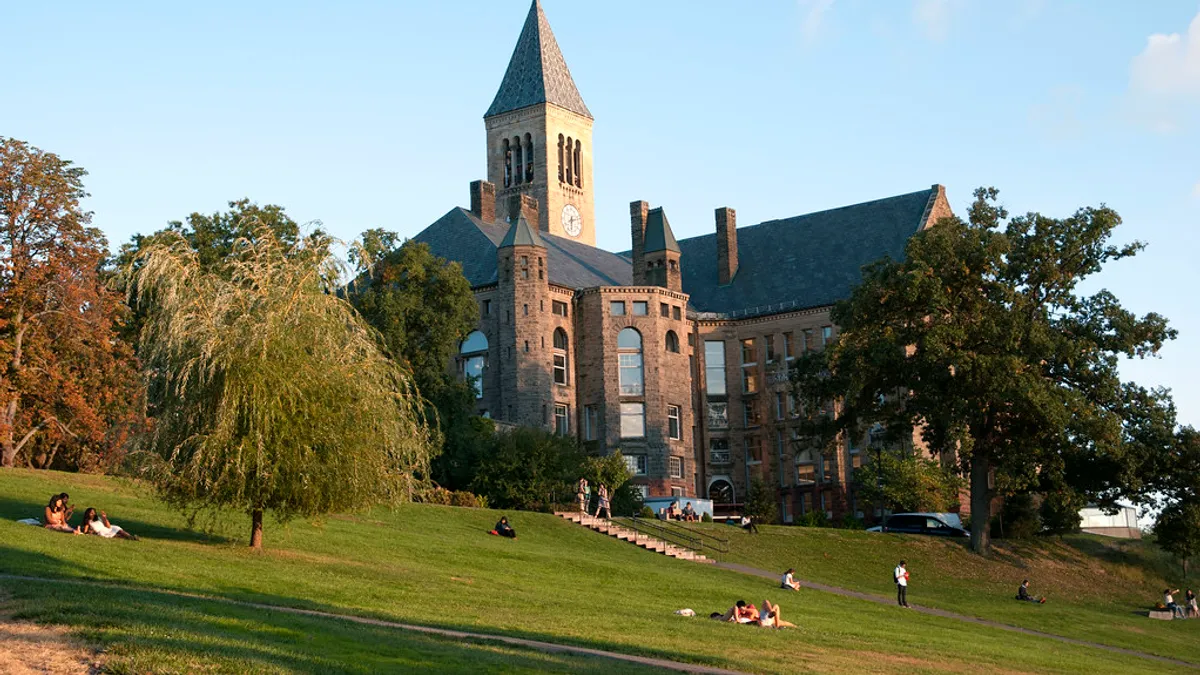Dive Brief:
- Colleges across the U.S. are increasing their COVID-19 precautions midway through the academic year in the face of increasing case counts, in some instances moving final exams online, starting to require booster shots and extending mask mandates.
- The measures come after many institutions have spent the year rolling back changes put in place during the pandemic, with colleges across the country returning to in-person learning this fall and at times relaxing mask mandates. Earlier this month, some colleges stopped plans to require employees to be vaccinated against the coronavirus after a federal judge blocked a mandate from President Joe Biden intended to require workers for federal contractors to get the shots.
- New York University is one example of an institution adding new precautions at the end of the fall term. The roughly 54,000-student nonprofit university on Wednesday canceled most in-person meetings and moved most final exams online, a day after announcing it will require booster shots by mid-January. The university's additional precautions came after a "sharp acceleration" in the rate of COVID-19 cases, John Beckman, a spokesperson, said in an email. They are part of an effort to help students return home safely for winter break and "limit the spread of the Omicron variant to vulnerable populations," Beckman said.
Dive Insight:
Coronavirus cases appear to be going up because of new variants and immunity waning months after vaccinations were administered, experts say. As conditions were improving, some institutions lightened mitigation efforts like testing or masks, said Gerri Taylor, co-chair of the American College Health Association's COVID-19 task force.
Colleges' vaccination practices will be an important part of preventing major outbreaks at this point in the pandemic, she said.
"If a student's immunity is waning, they will be most susceptible when they're at home or when they first come back to campus," she said. "In order to prevent major outbreaks, everyone should get the booster."
Taylor advised college administrators to invest in on-campus health resources and personnel because health center employees are overwhelmed.
"If schools do decide to require boosters, they need to have some additional staff in place to track those boosters and ensure compliance," she said.
The Centers for Disease Control and Prevention confirmed the first omicron variant case in the U.S. on Dec. 1. It now makes up roughly 3% of U.S. cases sequenced. In New York and New Jersey, omicron makes up an estimated 13% of cases.
Although institutions have taken significant actions in response, the steps are generally not as extreme as those taken earlier in the pandemic when students and staff were sent home. At NYU, offices should remain open and staffed with in-person workers as needed to support activities at the end of the semester, according to a university announcement. But managers have discretion to allow remote work if essential functions are met, the university said.
At Cornell University, 1,082 student coronavirus cases were reported the week ending Dec. 14. A "very high percentage" are omicron variant cases in fully vaccinated individuals, according to Joel Malina, Cornell vice president for university relations. As a result, Cornell's Ithaca, New York, campus raised its alert level Tuesday, canceling all undergraduate and university-sponsored events and moving final exams online.
Less than two hours away, Syracuse University announced all students and employees who regularly visit one of its campuses must get a booster shot before the spring term or as soon as they are eligible. Students will need to take a coronavirus test when they return from winter break.
Elsewhere, Loyola University Chicago will require students and employees to get a booster shot as soon as they are eligible, according to an email sent Wednesday.
On Wednesday, George Washington University canceled in-person events. It also moved final exams online starting Friday. There were 488 active COVID-19 cases at the university, with positive test results spiking this week.
The University of Wyoming's board of trustees voted Wednesday to extend a requirement that students and staff wear masks inside most university buildings when they're unable to socially distance, the Casper Star-Tribune reported. It will now be in place until the middle of February, at which point the board will review the policy again.
Precautions are not limited to U.S. colleges. In Canada this week, at least three institutions announced changes for the winter and spring terms. The University of Toronto canceled in-person finals and delayed spring in-person learning until Jan. 31. At McMaster University, spring classes will be held virtually for the first week of the winter term and students will move back into on-campus residences Jan. 14, a week later than originally planned. Instruction at York University will start Jan. 10 as planned, but in-person learning is delayed until Jan. 24.














